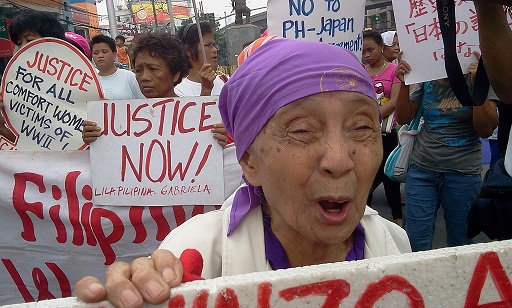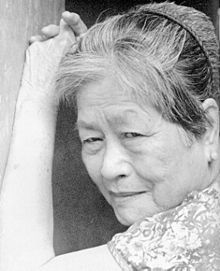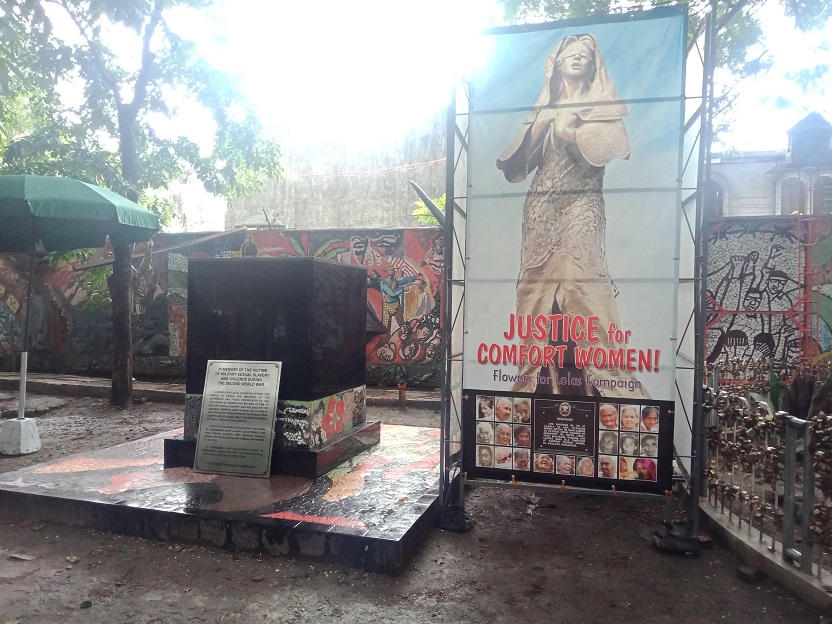Text and photos by JOHNNA VILLAVIRAY-GIOLAGON
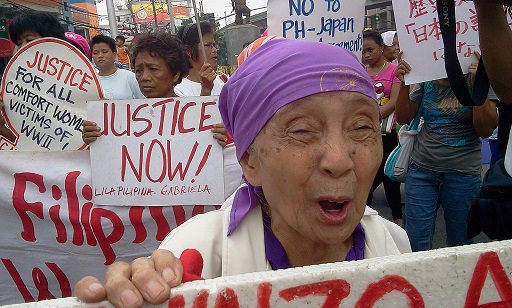 THERE were six of them, all in their 80s. They walked in a shuffle careful about balance.
THERE were six of them, all in their 80s. They walked in a shuffle careful about balance.
Accompanied by supporters, they braved the heat of the morning sun, to knock on the gates of Malacañang Palace, where President Aquino was meeting Japanese Prime Minister Shinzo Abe, crying for justice for the crime done against them some seven decades ago.
“Give these grandmothers justice…” cried Remedios Gialino holding a styrofoam placard announcing that she is a victim of “Japan’s military sexual slavery.”
Gialino was 14 years old when she was abducted and forced to service Japanese Imperial soldiers stationed in her native Calbayog City in the central Philippines.
Now 84 years old and hard of hearing, she is among the handful of former wartime comfort women able to physically campaign for recognition and reparation from the Japanese government.
Comfort women advocacy group Lila Filipina counts 101 of their members still alive. They’ve already lost 73 of their lolas (Pilipino for grandmother), with the latest death just earlier this month.
“’Noy, this is your chance to tell Abe what happened to us,” 83-year old Virgie Villama appealed to Aquino.
Villama recalled she was 14 years old in 1944 when she was abducted and forced into sexual slavery by Japanese soldiers in Manila. She escaped when the Americans retook the capital. She was raped by five men, one after the other, on her first night in the Japanese garrison in Pier 7.
Villama is taking exception to Japan’s insistence that sexual slavery during the war was not systematic nor was it sanctioned by the military institution.
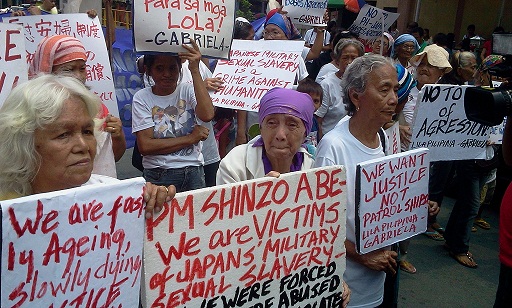 “We’re alive, we are living witness to the sexual slavery,” she cried as about 20 supporters – many of whom are their children and grandchildren – stood behind Villama and the five other lolas.
“We’re alive, we are living witness to the sexual slavery,” she cried as about 20 supporters – many of whom are their children and grandchildren – stood behind Villama and the five other lolas.
“We were forced…what you did was criminal. We did not (serve as comfort women) willingly.”
Nobody from Malacañang met with the lolas. The rally dispersed after about an hour and the lolas shuffled back to the jeep that took them to the Palace. Around that time Aquino and Abe have moved on to a state luncheon.
Lila Filipina Executive Director Rechilda Extramadura lamented that their lolas might not see justice in their lifetime. “They are old, and many are sickly and weak,” she said stating the obvious.
The lolas are campaigning for Japan’s recognition of how they were subjected to sexual slavery. They want their horror included in history books so that future generations will learn how a responsible regional leader should not behave. They also want compensation due to victims of atrocities of war.
Extramadura said that if Japan can provide military assistance to the Philippines, there is no reason why they cannot provide compensation to the lolas.
Asked how it feels that Philippine-Japan alliance has overshadowed their plight, 83-year old Estelita Dy said that “it would be sad if they don’t even mention it.”
Close to tears, Dy recalled that she as 14 years old and working as a vendor in the market in Talisay, Negros Occidental when Japanese soldiers came and arrested whoever they could. She was brought to the garrison and was raped as many as three times a night by men whose names she didn’t know.
Dy escaped when the Americans expelled the Japanese from Talisay. She remembers shouts of “Victory Joe” echoed in the background as she ran to freedom.
She said it pains her hat there has been no official acknowledgement of their traumatic experiences during the Japanese occupation.
Dy said their campaign for justice will not end when they pass away. “Our children and grandchildren will continue the fight (for us),” she said.
